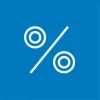As with any other business venture, when you trade forex, you need to monitor costs right from the start. That applies regardless of which Swiss or foreign forex broker you decide to use. Swiss brokers and banks follow international norms when setting their fees for forex trading.
The biggest cost in forex trading is the spread between the bid and ask prices. In contrast to stock trading, fixed transaction costs like brokerage fees are relatively uncommon in forex trading. However, some brokers (like Cornèrtrader) do charge a brokerage fee when you make trades below a certain size.
Additional costs may apply on top of the spread, depending on how you go about trading, and which forex broker you use. For example, you may pay rollover fees when you hold forex positions overnight, or you may pay fees for optional, specialized services. Inactivity fees are common among forex brokers, as they are among stock brokers: If you do not make any trades over a certain period of time, you have to pay a fee for inactivity. For example, Saxo Bank charges an 89-franc inactivity fee every quarter in which you do not buy or sell.
Exchange spreads are the biggest cost
The main cost of forex trading is found in the spreads. Also known as the bid-ask spread, this is the difference between the price which a broker charges for a currency, and the price they pay for the same currency.
Spread sizes vary depending on the currency pair. Spreads may also be higher or lower depending on the size of a trade, the size of your brokerage account balance, and the forex broker in question.
Spreads based on trade size and leverage
The sizes of spreads often vary based on trading volume.
The amount of leverage used can also impact spreads. The rule of thumb is that the less leverage you use, the smaller the spreads are, and the more likely you are to earn a return on the forex investment. Swissquote, for example, uses three different spreads per currency pair, with the spread you get dependent on how much money you have in your account.
Compare Swiss forex brokers
Forex fees vary between platforms and service providers, so comparing forex brokers is worth it. Note that trading costs can vary broadly between currency pairs, even when you use the same broker.
Example: Suppose you are interested in the most commonly traded currency pair, the EURUSD pair. The minimum spreads which Swissquote applies to EUR/USD trades are 1.7 pips (account balance of 1000 to 10,000 US dollars), 1.4 pips (10,000 to 50,000 dollars in your account), or 1.1 pips (with account balance higher than 50,000 dollars).
The spread for trading the same EUR/USD currency pair with Saxo Bank at the time this article was written is 2.3 pips (classic forex account with a minimum balance of 2000 francs) or 2 pips (platinum account with a minimum balance of 250,000 francs).
Beware of variable spreads
Be aware that forex brokers may adjust spreads when the market for a currency shows high volatility or illiquidity. Spreads can suddenly become much bigger, in which case the cost of trading that currency could go up in a big way. This may be triggered by announcements from central banks and other market-relevant events. Spreads can also widen when major currency exchanges open or just before they close.
What are pips?
Forex spreads are shown in pips. A pip normally represents the last number in a currency’s published price. The spread – the difference between the buy and sell rate – makes up the broker’s fee.
Example: You want to buy euros with Swiss francs (go long on the EURCHF pair in trading jargon) because you believe the euro will soon gain value against the Swiss franc. You open a buy position for the EUR/CHF currency pair.
The broker’s prices for the EUR/CHF pair are 1.0948 (bid) and 1.0951 (ask). The ask price shows how many Swiss francs you have to pay for each euro. The bid price shows how many francs you will get for each euro if you sold them at this time. The spread is 0.0003 francs, or 3 pips.
If you buy 10,000 euros at the quoted rate, you will pay 10,951 francs for them. If you were to sell those euros at the quoted rate (assuming rates have not changed since you bought them), you would get 10,948 francs. So the cost of the trade would be 3 francs.
Fees for leveraged forex trading
Because gains and losses in a currency’s value are normally very small, forex traders normally make use of leverage. This lets you greatly amplify gains, but also amplifies losses. Swissquote, for example, lets you buy currencies with a leverage ratio of 1:100, meaning for every 1 franc (or other currency unit) you invest, you can buy up to 100 francs worth of the target currency using leverage.
When you use leverage to trade currencies, you borrow money from the forex broker and invest it in the currency you want. This loan is secured by collateral – assets held in your brokerage account (including the currency you buy), the value of which makes up your margin.
If the value of your assets declines to where they no longer provide enough collateral to secure the loan, you will normally receive a margin call. When this happens, you will either have to close the position by selling the currency – normally at a loss – or quickly transfer more money to your account to increase your collateral, and subsequently the size of your margin.
Important: Not all brokers give you a warning in the form of a margin call. Some forex brokers simply sell your currency when your margin is exceeded, which generally results in losses for you. For this reason, it is very important that you only use a small percentage of your available margin at any one time. This allows for major fluctuations without the risk of your currency being sold at an unfavorable time.
Using leverage for intraday trading normally does not cost you anything at all, but you will generally pay interest when you hold a currency position overnight or over the weekend. In forex jargon, the interest and possible fees you pay in the form of markups are known as forex rollover.
As with other kinds of loans, the cost of leverage is calculated based on an annual interest rate and the number of days (or nights) over which you hold a leveraged position. Because of the cost of holding positions overnight, many forex traders aim to buy a currency and then sell it at a profit within a single trading day.
Fees for optional services
Many forex brokers offer optional services which you can choose to use if you want to. These may include subscriptions to relevant news reports, market data, or sentiment analyses. Many brokers also charge extra fees for tax statements, outgoing bank transfers, and accepting orders over the phone.
More on this topic:
Forex gain and loss calculator
Forex position size calculator
Forex stop loss and take profit calculator
Pip calculator
Swiss forex broker comparison
Spreads explained










